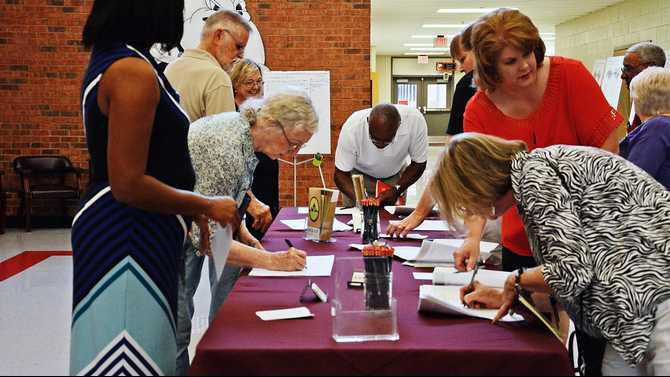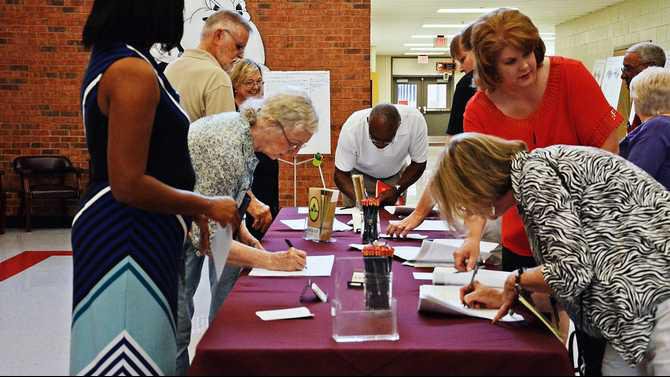With the final public hearing on the 2050 Plan’s first version in the rear-view mirror, planners, officials and the new citizens’ panel have their work cut out for them.
But they have no deadline. Taking their time is encouraged.
“The next step is to take a breath, allow the panel some leeway as we maybe just get them together and let them sort of work independent for awhile and not have to worry so much about schedules, so they don’t feel there’s a deadline or feel they’re going to be forced into something,” Newton County Commission Chairman Keith Ellis said Friday.
“This is not a panel that’s going to vote,” he said. “The panel is really just there to bounce ideas off each other to work together and get things in perspective.”
Thursday’s final public hearing was at Oak Hill Elementary School in southwestern Newton County. Like the previous four, the hearing was well-attended. And like the last hearing, participants were asked if they wanted to break up into small-group discussions to hash through specific points in the plan with elected officials. Most did.
“I was not in all the sessions, I don’t know how (other officials’) went, but I was really pleased with ours,” Ellis said. “We had around 20 or so people who came and started out and posed really good questions, and they also began giving some scenarios that we really ought to look at it. I think it’s really good for them to offer the ideas.”
As usual, discussions focused on the two main problems generally seen in the plan – lot-size minimums and transferrable development rights.
“They were really interested in TDRs,” Ellis said. “We had some large landowners there and some from neighborhoods that probably won’t be affected a whole lot except the densities might raise around them.
“We had a lot of people who asked an awful lot of good questions. I was lucky that the county attorney was there in that session, for quite awhile, too, and when I had no answer I was able to refer questions to her. We were able to keep track of all the questions that were there and we had people offer to be part of the panel.”
Thursday night’s hearing, Ellis said, was “the final episode right now for the public episode, like a season finale … and we are going to have a new season.
“The task is kind of coming back to us now through this panel. They’ll be able to make some sense hopefully about what the impact is from TDRs and the land sizes.”
There are few rules for the panel. They don’t have to but can meet in public, according to the county attorney. And if the panel wants to break up into subcommittees, “we should let them,” Ellis said.
“We want the citizens to feel like they’re included and that they’ve been a part of the process and the panel is going to allow some of that.”
Hunter Hall, chairman of the Newton County Chamber of Commerce and the lead speaker at each of the hearings, said planners will take into account all citizens’ questions and proffered solutions in forming version two, after which the process will begin again.
He said the public hearing process will be the same on version two, although there might not be exactly five hearings the second time around. After the second round of hearings, version three will be prepared and given to the county and each of the municipalities for their input and tweaking.
“We’re so, so far from any version of the final document,” he said. Although the original intent was to have version two finished by the end of the September, that is no longer on the table.
“The process is still far out in front of us, and the county, cities and water and sewer authority are all going to come together and do what’s best for our community,” Ellis said.
“We’re not putting this in the cellar, but what we’re doing is allowing some of this to soak in and allow the folks that are giving their time to reflect on all the data they will be given - emails, the letters, the suggestions - and let them go through them. This document is a difficult document.
“I appreciate the consultants work at this point and all the work that’s been involved for so many years. There’s been a lot of volunteers already that probably didn’t get credit for what they’ve done over the years.”
To learn more about the plan as-is, visit www.2050plan.org.
Panels gains, loses members
One more member of the 2050 citizens’ panel was confirmed Thursday night – Andre Cooper, appointed by Commissioner JC Henderson.
On Friday, Commissioner John Douglas’ appointee, Sandy Morehouse, stepped down. Douglas said in an email that Morehouse agreed because “his appointment became the main topic of conversation and contention rather than the plan itself.” Morehouse is the owner of Burge Plantation.





